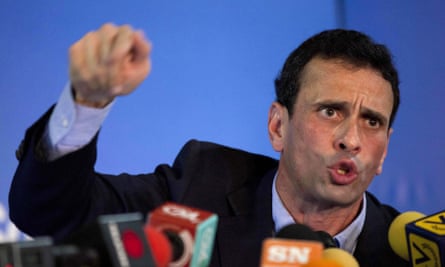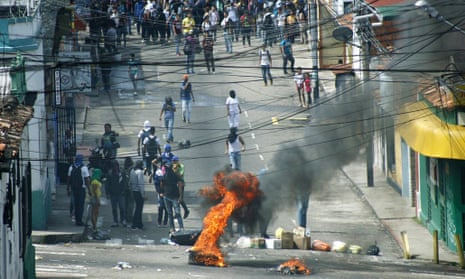Even Venezuela’s most conciliatory opposition leader has had enough.
Amid sky-high inflation, an absent president, snaking queues outside supermarkets, and plummeting oil prices, Henrique Capriles said this week that the time was ripe to try to force a change.
“We are in a state of emergency,” he said on Monday. “This is the time to mobilise in the streets.”
The call to protest was significant because Capriles, a state governor, disavowed last year’s violent protests demanding the resignation of Nicolás Maduro, Venezuela’s president. Instead, Capriles had advocated regime change through the ballot box.
But the situation on the ground has changed since then. Venezuela’s economy is estimated to have shrunk by 4% in 2014, with inflation hitting 64%. The price of oil, which accounts for more than 95% of Venezuela’s hard-currency income, continues to fall. According to the latest opinion poll, Maduro enjoys the support of just 22% of the population, and he has come under fire on social media and editorial pages for spending nearly two weeks outside the country – with his extended family in tow – while the crisis deepens.
Most worrying for Venezuelans are food shortages. Standing in line for hours to buy basic subsidised goods such as milk, soap and diapers has become an exhausting reality of everyday life, but tensions have grown since stocks are running lower than usual after the holidays and police began enforcing a policy that limits patrons to two shopping days a week at government-run supermarkets. In three states, authorities have banned overnight queues.
Capriles, who narrowly lost the presidency to Maduro in 2013, met with other opposition leaders throughout the week to define their protest strategy.

But in the western city of San Cristóbal, the flashpoint of last year’s protests, a small group of students have already begun to set up roadblocks and burn tyres, according to Reuters. Flashes of protest at supermarkets in Caracas have landed a handful of people in jail.
“Venezuela is living in a state of perpetual crisis,” says Carlos Romero, a Caracas-based political analyst. “But it’s been a stable crisis,” he says, adding that despite rumours of a possible coup or an impending debt default, Maduro still holds the political reins.
In December, Maduro confirmed that the country was in recession, but blamed an “economic war” orchestrated by political foes.
“The strategy that they are carrying out aims to disrupt civilians and cause extreme situations, that is the key part of their efforts to destabilise the country,” Maduro told reporters. “An economic coup is also under way in Venezuela,” he said.
The president, who succeeded the father of Venezuela’s socialist revolution, Hugo Chávez, two years ago, set off on 4 January on a whirlwind tour of China, Russia and several Opec nations to seek fresh money to shore up the Venezuelan economy and try to convince other oil producers to curtail production.
In Beijing, Maduro announced that China had agreed to invest more than $20bn (£13.2bn) in Venezuela, but it remains unclear whether the sum represented a fresh arrangement or was part of pre-existing oil-for-loans deals. Even if the investments are new, it is far from certain that this is money that the Venezuelan government can use for imports or debt repayments.
Oil prices continued to drop during his tour but after meeting Vladimir Putin on Thursday, Maduro said he secured enough pledges of money to buttress Venezuela’s economy.
“I have got the funds needed so that the country can maintain its rhythm of investment, of imports and economic stability,” he announced from Moscow. There was speculation in Caracas about whether he might fly next to Mexico, another major oil producer, for a meeting with President Enrique Peña Nieto.
Maduro is due to address the National Assembly – Venezuela’s unicameral legislature – on 20 January.

Comments (…)
Sign in or create your Guardian account to join the discussion